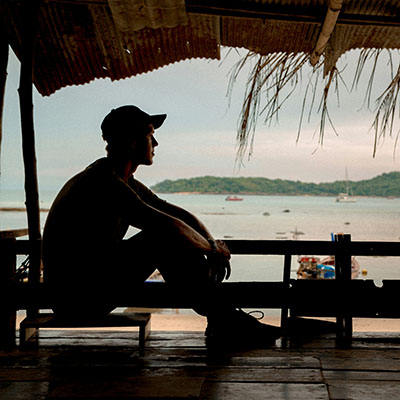Best Places for Students & How to Choose the Right One for You
Travel Team | Mar 6, 2024
.jpg?sfvrsn=a643d172_1)
They say the journey of a thousand miles begins with a single step. When it comes to studying abroad, a solid first step is deciding where to go.
Everyone’s dream destination will vary, but if you’re an indecisive traveler — or just overwhelmed by all the possibilities — we can help.
How to Choose the Best Place to Study Abroad in College
Ask yourself these six questions to find the best place to study abroad.
1. How will studying abroad affect me academically?
One of the first things you’ll need to keep in mind is how your time abroad will impact your studies. Start by looking at the destinations and programs your university offers or has already approved. That increases the odds that you’ll be able to earn credit toward your degree for the classes taken abroad.

Take some time to consider your academic goals and how many credits you can get from your time abroad. While travel is gratifying, you don’t want to choose a destination that will put you behind academically.
"Many people are tempted to complete their general education requirements early in their college career so they can focus on their major as juniors and seniors,” says Becky Hart, a Seven Corners writer who studied in Mexico and Chile in college. “If you’re considering studying abroad, save some of those electives for your time away. Your home university will be more likely to accept transfer credits for electives than they will be for major requirements.”
If you’re taking foreign language courses, studying abroad is an ideal way to hone those classroom skills through immersion in the real world. Another Seven Corners writer who studies abroad, Grace Lower, was able to complete her Spanish minor during her time in Granada, Spain.
“I learned more conversational Spanish in those six months than I had in eight years of traditional classes,” she said.
When you’re studying a widely spoken language like Spanish, French, or Arabic, you’ll have plenty of destinations to choose from. As you narrow down your options, be sure to take local dialects into account. If you’ve studied Brazilian Portuguese, for instance, the European Portuguese you’ll hear in Portugal may take some getting used to.
2. Where can I afford to study abroad?
While it’s important to dream big, you’ll want to stay realistic about your finances.
First, you’ll need to do some basic research on your host country’s cost of living. Websites like Numbeo have helpful breakdowns on items like rent, groceries, and restaurant prices. For more expensive countries like Singapore or Norway, you’ll need to save a little extra for housing, food, and recreation, especially if you’re not traveling as part of a school-sponsored program that includes room and board.
Be mindful of how much travel you’re hoping to do once you get there. Bus or train fare, hotels, and other travel arrangements for a weekend trip between classes can add up. For countries with limited railway systems (we’re looking at you, Spain), you may have to build more room into your budget if you want to explore in your free time.
As you prepare for your trip, consider using tools like our study abroad budget template. It may feel like a bit of a wake-up call, but your finances will play a key role in determining what destinations are the best fit for you.
3. Where is my comfort zone when traveling internationally?
It’s great to get out of your comfort zone when you travel, but you need to be realistic about where to draw the line. You want to feel safe in your host country, and that definition can vary based on your sense of risk aversion.

As you research destinations, ask the following questions about each location:
- Are there any social customs or cultural attitudes that might make you feel unsafe?
- Are you comfortable in a country where your religion isn’t practiced?
- Are you comfortable in a country with very conservative policies? What about one with very progressive policies?
- How would you feel in a country with radically different gender roles?
- Do you like your host country’s cuisine? Will you still like it after a few months?
- If you have any food allergies or intolerances, will you be safely accommodated?
- Do you have any health concerns that could limit where you travel?
- What’s the crime rate in your potential host city?
Here’s a bonus tip from Becky: Don’t confuse being uncomfortable with being unsafe. Sometimes they’re the same, but sometimes that first step outside your comfort zone is the first step toward something greater. A little (calculated) uneasiness could be exactly what you need.
4. What’s the political landscape like?
No matter where you are in the world, it’s impossible to divorce politics from daily life. As you decide on a destination, take the time to understand the political forces shaping your potential host country.
What perception does the public have of its leaders? Is there significant corruption on a local or national scale? Is there any instability that may make the country unsafe for foreign guests?
If the headlines from your host country have you worried about its stability, you may want to reconsider that country as a study abroad destination.
“Figuring out what the political climate is at your destination isn’t always black and white,” says Becky. “If you can, talk to someone who has visited that country recently to get their first-hand account.
“One of the most refreshing parts about my travel in Latin America — as a student and after I graduated — was how locals were often able to separate me from the American government. While they weren’t always fans of U.S. politics, they were still welcoming to me as an individual.”
5. What kind of social life do you want while studying abroad?
For some travelers, the idea of visiting a new destination with a large group of friends feels stifling. For others, it can be a great way to strengthen existing relationships.
When planning your own travels, ask yourself if you’d rather go solo or have a few friends there as a safety net.
The destination you choose also will have a significant impact on who you spend your time with and what you’ll be doing. If you decide to study abroad in a small fishing village, you’re bound to have different social activities than if you studied abroad in a capital city. Make sure you know what you’re getting into.
6. What kind of atmosphere do you want?
It sounds surface-level, but when you’re picking a destination, it helps to take the aesthetic of the location into account.
Of course, definitions of beauty can vary. If you’re a sucker for the great outdoors, try looking into destinations with easy access to mountains, beaches, or forests. If you’re drawn to architecture and design, consider major cities with thriving arts scenes.
“Trust me,” says Grace. “This decision isn’t just about how many likes you’ll get on Instagram. There’s nothing better than exploring a place that energizes and inspires you, and the right study abroad destination can do just that.”
Best Places to Travel as a Student
Whether you choose these destinations as a home base for your study abroad or simply add them to your list of weekend getaways, these must-see sites are perfect for student travelers.
1. Ireland
 If you’re looking for art and culture laced with history and tradition, look no further than Ireland. Ireland is a popular study abroad destination for students of business, technology, pharmaceuticals, and the arts.
If you’re looking for art and culture laced with history and tradition, look no further than Ireland. Ireland is a popular study abroad destination for students of business, technology, pharmaceuticals, and the arts.
The University College Dublin touts Ireland’s scenery, coasts, and mountains for those who love the outdoors. And for the more indoorsy types, there are museums, a strong coffee culture, and, of course, pubs that will offer more cultural education than your parents might think.
Ireland is also popular among U.S. students who want that international experience but don’t have a foreign language in their back pocket (although Gaeilge/Irish is an official language along with English). Because it's one of the best places to study abroad for English speakers, many experts say places like Ireland and England are great for first-time international travelers.
While the experts aren’t wrong, keep in mind that Ireland can still take you outside your comfort zone. Just because English is spoken, don’t be fooled into thinking the culture there is the same as in the U.S. Culture shock is still a real possibility.
2. Australia
The University of Melbourne was picked as the top Australian school in the U.S. News Best Global Universities rankings. Opportunity abounds thanks to several campuses across the country and both undergraduate and degree programs in a wide range of fields.
That being said, think about what Australia is most famous for — kangaroos, the Great Barrier Reef, an epically long human history — and pursue courses in related fields like biology, geology, and anthropology.
Australia is also renowned for its active lifestyle full of hiking, surfing, kayaking, and scuba diving. If you think all work and no play makes for a boring way to spend your day, then the Land of Oz may be right up your alley.
Like Ireland, Australia may make the top of the list for U.S. students who are only comfortable speaking English. Just know that Aussie English has some interesting variations that may leave you as flummoxed as if they were speaking Dutch.
You'll have plenty of time to figure it out, though. Australia is not a short-term trip, and flights from the U.S. can take 24 hours or longer. We love Australia as an option if you want to study abroad for a year.
3. Thailand
 Thailand gets high marks for being an affordable destination, something that may be particularly important to you as a student traveler. Accommodations and food are both student-friendly (AKA inexpensive) if you’re traveling and studying on a budget.
Thailand gets high marks for being an affordable destination, something that may be particularly important to you as a student traveler. Accommodations and food are both student-friendly (AKA inexpensive) if you’re traveling and studying on a budget.
Although Thailand doesn’t have the storied universities of an English Cambridge or Oxford, it does offer some appealing programs depending on your interests. Popular Thai study abroad programs include Southeast Asian Studies, biology, and wildlife studies.
There are also lots of voluntourism opportunities, if you’re looking to combine your studies with a bit of giving back.
If you’re looking for one place to start your journey, try Bangkok. For student travelers, a visit to Bangkok makes for an extraordinary adventure. Need a place for inexpensive souvenirs? Try Chatuchak Weekend Market. Looking for cheap eats? The city is teeming with street vendors and affordable restaurants where you can order everything from stewed chicken feet to a traditional bowl of Pad Thai.
When you’re not exploring Bangkok’s famous floating markets or admiring the city’s architecture, you can kick back in the scenic Lumphini Park, free of charge.
4. Japan
Japan is a fascinating lesson in historic-meets-modern: traditional tea ceremonies and vending-machine cake in a can, ancient Buddhist temples and Tokyo’s new Toranomon-Azabudai tower, intricate samurai armor and modern manga. You can spend days practicing your Zen meditation or take two hours to travel from Tokyo to Osaka on the shinkansen bullet train (typically a seven-hour trip by car).
Although Japan isn’t typically at the top of most American study abroad lists, it is growing in popularity. This is especially true for STEM students as Japan continues to prove itself as a world leader in high-tech innovation.
If there are downsides to studying in Japan, it’s the difficulty of learning the language — the alphabet is really three writing systems — and the expense. Just like any country, the cost of living in Japan can vary by city or region, but it’s worth noting that Tokyo is routinely listed among the 10 most expensive cities in the world.
5. Spain
 Spain makes many lists as one of the most popular destinations for students in Europe, especially if your reason for travel is to learn a new language. Business and marketing are also popular fields of study en España.
Spain makes many lists as one of the most popular destinations for students in Europe, especially if your reason for travel is to learn a new language. Business and marketing are also popular fields of study en España.
Some of the country’s universities are among the oldest in the world and enjoy a reputation that speaks to their longevity. The University of Barcelona, considered the best school in Spain, was founded in 1450. Madrid also has a strong student scene, although don’t sleep on Seville and Valencia, either.
We also love Spain as a place for students because of the variety it brings to the table. Its major cities, like Madrid and Barcelona, are steeped in art, cultural attractions, and nightlife. Spots like Pamplona offer some truly unique traditional experiences (for your safety, just don’t actually run with the bulls).
And when you’re ready to get away for some R&R, Mallorca and plenty of seaside towns are ready for you. Just be prepared to pay extra for the resort atmosphere.
6. Costa Rica
Costa Rica is one of the best vacation destinations. The things that make it so great for tourism can be both pros and cons when it comes to Costa Rica as a study abroad site.
Your hosts will be used to international visitors, which can make it relatively easy for you to find your stride in a new country. You’ll generally find people are friendly toward you, even as an outsider. However, because they may be used to accommodating tourists, you might find it difficult to immerse yourself in “authentic” Costa Rican culture.
Central America can be budget friendly, but Costa Rica has its share of tourist traps. These can drive the price of everything, from hotels to food to activities, higher. You can still stay on budget, but you’ll need to be vigilant and maybe learn to haggle for a fair deal.
Because of its reputation as an eco-friendly destination, Costa Rica is a great place for coursework in environmental studies, biology or wildlife studies, or even tourism management. Tell your parents you’re doing experiential learning and spend some time exploring the jungle and volcanoes, taking surfing lessons, and perusing marketplaces. (It wouldn't hurt to send them this parents’ guide to study abroad, too.)
7. Puerto Rico
 For U.S. students, one of the main appeals of studying in Puerto Rico is its convenience. You don’t need a passport to visit, the U.S. dollar is the currency, and flights to the island are relatively easy to find from Florida and East Coast cities.
For U.S. students, one of the main appeals of studying in Puerto Rico is its convenience. You don’t need a passport to visit, the U.S. dollar is the currency, and flights to the island are relatively easy to find from Florida and East Coast cities.
Consider Puerto Rico if you’re looking to improve your Spanish, want to learn beachside, or are into history.
You’ll find all the allure of a tropical destination for a fraction of the cost. With so much beauty concentrated in one destination, you won’t have to go far (or spend much money) to experience what Puerto Rico can offer.
Join a free walking tour of Old San Juan to learn about the city’s past. Make sure you explore Puerto Rico’s famous fortresses, Castillo San Felipe del Morro and Castillo San Cristobal. After a long day of exploration, there’s nothing better than unwinding at one of Puerto Rico’s many gorgeous beaches.
Best Travel Insurance for Student Travel
If you’re traveling as part of an organized study abroad program, the university likely has specific travel insurance requirements. Most study abroad programs expect you to have, at a minimum, travel medical insurance to cover healthcare expenses if you get sick or hurt during your trip. It’s unlikely that your health insurance at home (or your parents’ insurance if you’re still on their plan) will provide coverage when you’re out of the country.
You’ll also want to consider trip protection benefits that can reimburse you for prepaid, nonrefundable trip expenses if you have to cancel or interrupt your trip. This type of travel insurance can also cover you during trip delays, if your luggage is lost or stolen, and more.
It’s all about protecting the money you spent for your trip, and as a student, you probably don’t have a lot of extra money to burn when something goes wrong.
Seven Corners offers travel insurance to fit a wide range of needs and budgets. This includes plans with high levels of travel medical coverage, trip protection, or a combination of both. There’s also our Backpacker Travel Insurance plan that offers protection for those on a tight budget.
Before you study abroad, visit our website to get a quick quote online. If you have questions about a plan, what a term means, and whether it’s enough coverage for your trip, contact our licensed sales agents via phone or email. Don’t let a lack of coverage keep you from the experience of a lifetime.
About the Authors
This article was written by Grace Lower and Becky Hart, both of whom are experienced travelers and have earned their status as study abroad experts through first-hand experience. You might say they’ve been there, done that ... several times.
Travel Like a Pro with The Wayfinder
Did you enjoy this blog? Get more articles like it before anyone else when you subscribe to our monthly newsletter, The Wayfinder.
Sign me upSearch Posts
Receive our monthly inspiration and travel tips from the travel insurance experts.
Sign me upThis website and various social media updates provided by Seven Corners contain content, information, articles, videos, and links to websites created by third parties. Seven Corners, its owners, and its employees neither endorse nor are responsible for the accuracy, timeliness, or reliability of any third-party information, statements, opinions, or advice and are not liable for any loss, harm, or damage caused by your reliance upon them. Use of such information or the linked websites is entirely at your risk. Concerns regarding this third-party content should be directed to the third party. Seek professional advice, as appropriate, regarding your use of such information and websites.
Because the information on this website and in Seven Corners’ blogs and other social media is written and compiled using knowledge and information available at a certain point in time, it may become outdated. For that reason, information, events, legal requirements, and product changes (including benefits, limitations, exclusions, and services) may not be up-to-date, complete, or accurate at the point in time it is being read. Again, use of such information is at your risk.
